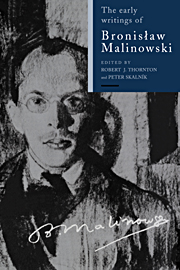Introduction: Malinowski's reading, writing, 1904–1914
Published online by Cambridge University Press: 18 December 2009
Summary
This volume makes available for the first time to an English-speaking audience Bronisław Malinowski's earliest, formative writings. With this volume, most of Bronisław Malinowski's previously unpublished or otherwise inaccessible writings have now been published or reissued. Several recent publications have brought to light manuscripts from the beginning and the end of his career (Malinowski 1988; Malinowski and de la Fuente 1982), and other efforts have given us much more insight into the richness and detail of his ethnographic theory and practice. There has been increasing interest in Malinowski in Poland, the country of his birth and education, and Polish scholars have contributed important new studies on Malinowski's intellectual roots in Europe (Ellen et al. 1988; A. Flis 1983, 1984; A. Flis and Paluch 1984; M. Flis and Paluch 1985; Kempny 1979; Kubica and Mucha 1985; Paluch 1981a; Średniawa 1981; Strenski 1981), and we now possess a better understanding of the historical and social context in which he came of age as an anthropologist, a scholar, and a ‘good European’ (Clifford 1986; Geertz 1967; 1988; Gellner 1987; Stocking 1986; Strathern 1987; Thornton 1985).
ON MALINOWSKI'S WRITINGS FROM 1904 TO 1914
In the light of this, readers of this volume are entitled to ask what value is there now in publishing Malinowski's very earliest work, most of it written before he went ‘into the field’. Conventionally – by a convention that Malinowski himself invented, and that commentators have adhered to since – Malinowski's genius lies in his ethnographic work in the field, and in his authorial effort to relate this to the major currents of thought in the period during which he wrote his major works, that is, the period from 1920 to 1942 when he died suddenly and prematurely (Firth et al. 1957).
- Type
- Chapter
- Information
- The Early Writings of Bronislaw Malinowski , pp. 1 - 64Publisher: Cambridge University PressPrint publication year: 1993
- 2
- Cited by



